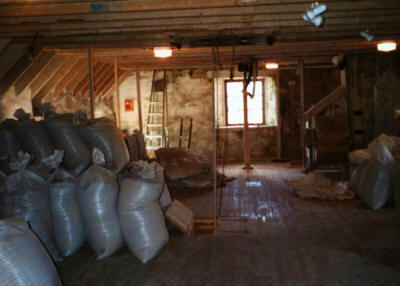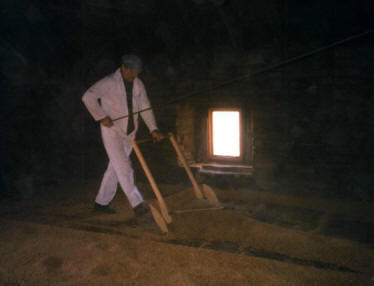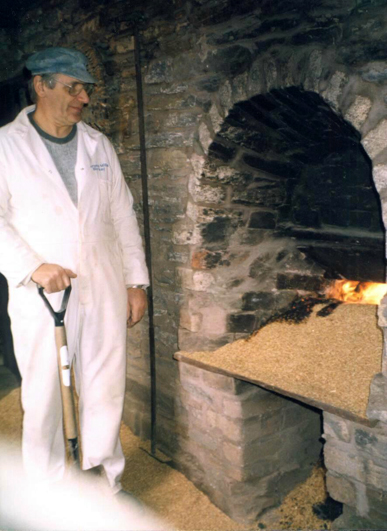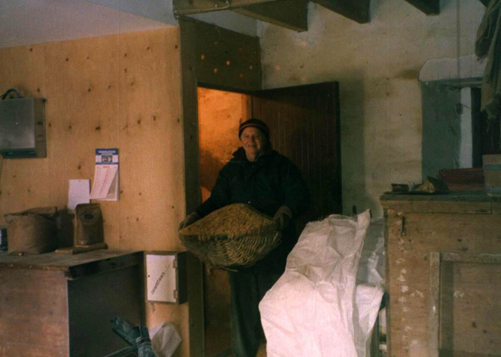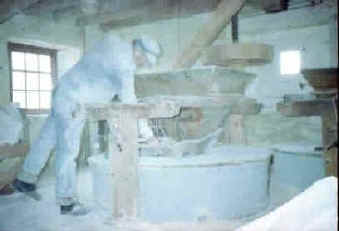|
Orkney Flours Project Orkney is fortunate in having a water powered meal mill still in operation grinding speciality flours. The Mill made it feasible for the Agronomy Institute (AI) of Orkney College (a campus of the University of the Highlands and Islands) to undertake the Orkney Flours Project. The Project is comprehensive in scope, studying all aspects from seed to finished products, ready to eat. In outline the investigations include:
The challenges to growing cereals in Orkney are the short, cool growing season, and the wind which so often damages the crop before harvest. Amongst the Scandinavian grains, several varieties of oats grow well (e.g. Fiia and Belinda). Surprisingly, wheat does better than expected, and stone-ground wheat can be used in Orkney baked bread. MILLING. The milling process begins when the grain has been delivered to the Mill and hoisted to the top floor. About one tonne of grain is then spread out on the kiln floor for some six to eight hours to dry.
For the Orkney Flours Project the kiln floor is divided by wooded boards to keep samples separated. Drying time does vary depending on the type of grain and the moisture level when harvested. Typically drying lowers the moisture content from something like 15-18% to 6-8%. Next the grain is fed to the 'shelling' or shelling stones to crack the outer husks; the mix of husks and kernels drop to the first fanner where a blast of air blows the husks into the 'scrubbie hoose' shown above. The grain is lifted up to the first floor to be ground by the French burr stones. With bere the result is very coarse meal; therefore the 'grap' is ground by a second pair of mill stones to yield flour that descends to sieves where the fine flour passes through to be bagged; material that is too large is collected at the end of the sieve, fanned and reground. The flow is shown in a diagram of the machinery. Most of the samples in the Orkney Flours Project were small, extra effort was devoted to keeping the various grains separate so the subsequent tests would be meaningful. As with the drying, there are no electronic instruments to control the milling; all depends on the experience of the miller. The flours were returned to the Agronomy Institute who then provided samples to project collaborators. Orkney College's Hospitality Department and the other project partners (see the logos below) did a splendid job developing recipes, and experimenting with variations on traditional recipes gathered from long time residents. The Barony Mills provides some recipes on this web site, and a booklet is available at the Mill. The Birsay Bay Tea Room has an delicious 6-B biscuit (Birsay Bay, Barony Bere, and Berry Biscuit). Stone ground oats have been well received , as the Mill can supply oatmeal at several grades of fineness. The Agronomy Institute has studied market potentials for local sales. As part of that study AI has received the cooperation of local bakers and butchers (for adding Orkney oats to products like haggis or sausages). We are very pleased to have participated in the Flours Project, and we wish the College every success in promoting Orkney flours. Funding for the project came from the Scottish Executive’s Food Processing, Marketing and Co-operation Grant Scheme, Orkney Islands Council and Highlands and Islands Enterprise. The University of the Highlands and Islands was the applicant for grant funding.
LINKS
|
